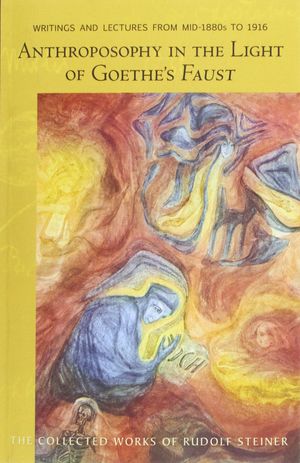Faust: Difference between revisions
From AnthroWiki
(Created page with "'''Faust''' is the protagonist of a classic {{German}} legend based on the historical Johann Georg Faust (c. 1480–1540). In England ist was popularised by...") |
No edit summary |
||
| Line 1: | Line 1: | ||
[[File:GA272 en 2014.jpg|thumb]] | |||
'''Faust''' is the protagonist of a classic {{German}} legend based on the historical [[Johann Georg Faust]] (c. 1480–1540). In [[w:England|England]] ist was popularised by [[w:Christopher Marlowe|Christopher Marlowe]]'s play ''[[w:The Tragical History of Doctor Faustus|The Tragical History of Doctor Faustus]]'', which was written around 1587. In Germany, it became well known namely through [[Goethe's Faust]]. Here Faust is shown as a man eternally striving out of his individual [[I]], who, despite his pact with Mephistopheles and all the resulting misdeeds, can - unlike in the original legend - finally be redeemed. | '''Faust''' is the protagonist of a classic {{German}} legend based on the historical [[Johann Georg Faust]] (c. 1480–1540). In [[w:England|England]] ist was popularised by [[w:Christopher Marlowe|Christopher Marlowe]]'s play ''[[w:The Tragical History of Doctor Faustus|The Tragical History of Doctor Faustus]]'', which was written around 1587. In Germany, it became well known namely through [[Goethe's Faust]]. Here Faust is shown as a man eternally striving out of his individual [[I]], who, despite his pact with Mephistopheles and all the resulting misdeeds, can - unlike in the original legend - finally be redeemed. | ||
Latest revision as of 15:32, 9 March 2022

Faust is the protagonist of a classic German legend based on the historical Johann Georg Faust (c. 1480–1540). In England ist was popularised by Christopher Marlowe's play The Tragical History of Doctor Faustus, which was written around 1587. In Germany, it became well known namely through Goethe's Faust. Here Faust is shown as a man eternally striving out of his individual I, who, despite his pact with Mephistopheles and all the resulting misdeeds, can - unlike in the original legend - finally be redeemed.
Literature
- Rudolf Steiner: Goethe’s Faust in the Light of Anthroposophy. Volume One of Spiritual–Scientific Commentaries on Goethe’s Faust. CW 272. Steiner Books 2013. ISBN 978-0880106399
- Rudolf Steiner: Goethe’s Faust in the Light of Anthroposophy. Volume Two of Spiritual–Scientific Commentaries on Goethe’s Faust. CW 273. Steiner Books 2016. ISBN 978-1621480914
German
- Rudolf Steiner: Geisteswissenschaftliche Erläuterungen zu Goethes «Faust», Band I: Faust, der strebende Mensch , GA 272 (1981), ISBN 3-7274-2720-5 English: rsarchive.org German: pdf pdf(2) html mobi epub archive.org
- Rudolf Steiner: Geisteswissenschaftliche Erläuterungen zu Goethes «Faust», Band II: Das Faust-Problem, GA 273 (1981), ISBN 3-7274-2730-2 English: rsarchive.org German: pdf pdf(2) html mobi epub archive.org
 |
References to the work of Rudolf Steiner follow Rudolf Steiner's Collected Works (CW or GA), Rudolf Steiner Verlag, Dornach/Switzerland, unless otherwise stated.
Email: verlag@steinerverlag.com URL: www.steinerverlag.com. Index to the Complete Works of Rudolf Steiner - Aelzina Books A complete list by Volume Number and a full list of known English translations you may also find at Rudolf Steiner's Collected Works Rudolf Steiner Archive - The largest online collection of Rudolf Steiner's books, lectures and articles in English. Rudolf Steiner Audio - Recorded and Read by Dale Brunsvold steinerbooks.org - Anthroposophic Press Inc. (USA) Rudolf Steiner Handbook - Christian Karl's proven standard work for orientation in Rudolf Steiner's Collected Works for free download as PDF. |
